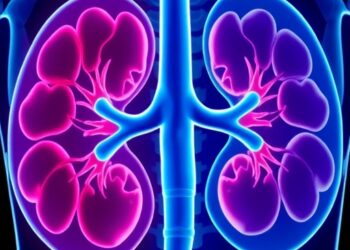Bottom Line: Patients with liver cancer who received immune checkpoint inhibitors (ICIs) before surgery—including those who would not have been eligible for surgery by conventional criteria—had similar outcomes to patients who received surgery upfront, according to results from a retrospective study.
Bottom Line: Patients with liver cancer who received immune checkpoint inhibitors (ICIs) before surgery—including those who would not have been eligible for surgery by conventional criteria—had similar outcomes to patients who received surgery upfront, according to results from a retrospective study.
Journal in Which the Study was Published: Cancer Research Communications, a journal of the American Association for Cancer Research (AACR)
Author: Mari Nakazawa, MD, first author of the study and a clinical research fellow at the Johns Hopkins Kimmel Cancer Center; and Mark Yarchoan, MD, senior author of the study and an associate professor of oncology at the Johns Hopkins Kimmel Cancer Center
Background: While immunotherapy has become a mainstay for the treatment of advanced or metastatic liver cancer, the primary curative treatment modality for patients with early-stage disease is surgery alone. Only around 30% of patients are eligible for surgical resection due to factors such as tumor size, proximity to critical structures, the presence of multiple tumor foci, and safety concerns, explained Nakazawa. She added that even patients who receive curative intent surgery often experience a recurrence.
“There’s a strong unmet need to expand the number of patients who may be eligible for surgery and, further, to transform more patients with early-stage liver cancer into long-term survivors of this disease,” Nakazawa said.
Studies from other cancers have shown that neoadjuvant immunotherapy may mitigate some high-risk features and help unresectable tumors meet the eligibility criteria for surgery. It may also help the immune system destroy micrometastases, thereby preventing distant recurrences later. The authors hypothesized that neoadjuvant ICI therapy may help make surgery safer and more effective in patients with high-risk, localized liver cancer.
How the Study was Conducted: Nakazawa, Yarchoan, and colleagues retrospectively examined outcomes from 92 patients who underwent resection for hepatocellular carcinoma at Johns Hopkins from 2017 to 2023. This included 36 patients who received neoadjuvant ICI therapy, many of whom were treated under clinical trial protocols assessing the feasibility and efficacy of immunotherapy prior to surgery. Prior to receipt of immunotherapy, 61.1% of these patients would not have been candidates for curative surgery based on traditional surgical resection criteria.
Results: Compared with patients who received surgery upfront, patients who received neoadjuvant ICIs more commonly exhibited high-risk disease features, including high serum alpha fetoprotein, tumors larger than 5 cm, portal vein invasion, and multiple tumor foci. High-risk features have previously been associated with worse outcomes.
In this study, however, patients who received neoadjuvant ICIs—who may have been expected to have worse outcomes due to high-risk features—had comparable outcomes to patients who received upfront surgery. Among those who received neoadjuvant ICIs, 94.4% underwent successful margin-negative surgical resection, and the median recurrence-free survival was 44.8 months, compared to 49.3 months among those treated with upfront surgery. The median overall survival was not reached in either cohort.
Author’s Comments: “This study shows that the criteria by which we classify patients as being candidates for curative therapy is probably too narrow for this disease,” Yarchoan said.
The authors emphasized that these findings are retrospective and intended to be hypothesis generating, but they believe these data set a promising stage for future research. “Prospective trials that are thoughtfully designed in the right populations can help us understand which patients can benefit most from this approach,” Nakazawa said.
“Our findings demonstrate that systemic therapy may not only be useful for patients with advanced disease but can potentially be paradigm changing in patients with early-stage disease,” Yarchoan added. “There is a group of patients with high-risk liver cancer who, in a contemporary era, may have long-term survival through aggressive treatment with systemic therapy followed by surgery.”
Study Limitations: Limitations of this study include its retrospective, single-institution nature with a relatively small sample size. Further, as the study cohort was compiled from patients treated in several different clinical trials, as well as those who underwent upfront surgery as the standard of care, factors such as baseline disease characteristics, the duration of neoadjuvant immunotherapy (if received), use of locoregional therapies, and receipt of adjuvant immunotherapy differed between patients.
Funding & Disclosures: Funding for this study was provided by the National Institutes of Health, the Lou and Nancy Grasmick Fellowship, the Linda Rubin Pancreatic Cancer Fellowship, and the James and Frances McGlothlin Fellows to Faculty Award. Yarchoan is a co-founder with equity of Adventris Pharmaceuticals; has received consulting fees from AstraZeneca, Exelixis, Genentech, Replimune, Hepion, and Lantheus; and has received research funding through Johns Hopkins from Bristol Myers Squibb, Exelixis, Incyte, and Genentech.
Journal
Cancer Research Communications
Article Title
Impact of neoadjuvant immunotherapy on recurrence-free survival in patients with high-risk localized HCC
Article Publication Date
15-Aug-2024
COI Statement
Funding for this study was provided by the National Institutes of Health, the Lou and Nancy Grasmick Fellowship, the Linda Rubin Pancreatic Cancer Fellowship, and the James and Frances McGlothlin Fellows to Faculty Award. Yarchoan is a co-founder with equity of Adventris Pharmaceuticals; has received consulting fees from AstraZeneca, Exelixis, Genentech, Replimune, Hepion, and Lantheus; and has received research funding through Johns Hopkins from Bristol Myers Squibb, Exelixis, Incyte, and Genentech.




